2021-2022学年人教版英语七年级下册Unit 12 Section A (Grammar Focus-3c)课件(23张)
文档属性
| 名称 | 2021-2022学年人教版英语七年级下册Unit 12 Section A (Grammar Focus-3c)课件(23张) |

|
|
| 格式 | pptx | ||
| 文件大小 | 3.3MB | ||
| 资源类型 | 教案 | ||
| 版本资源 | 人教新目标(Go for it)版 | ||
| 科目 | 英语 | ||
| 更新时间 | 2022-06-14 00:00:00 | ||
图片预览

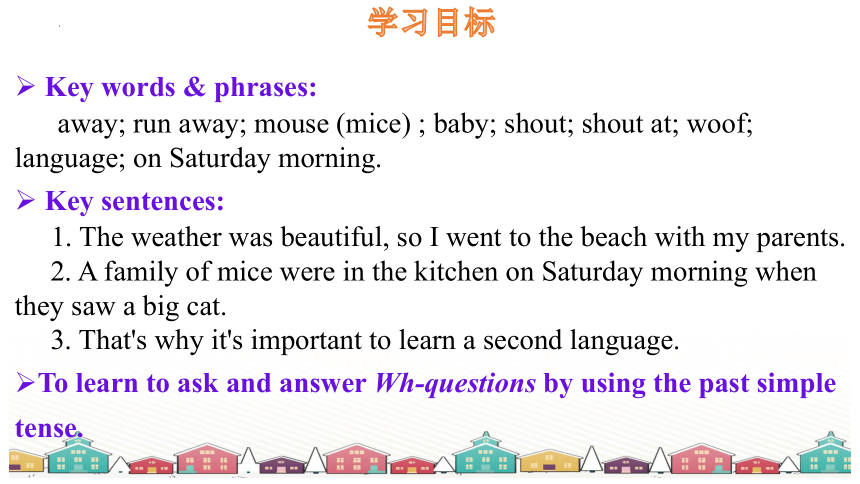
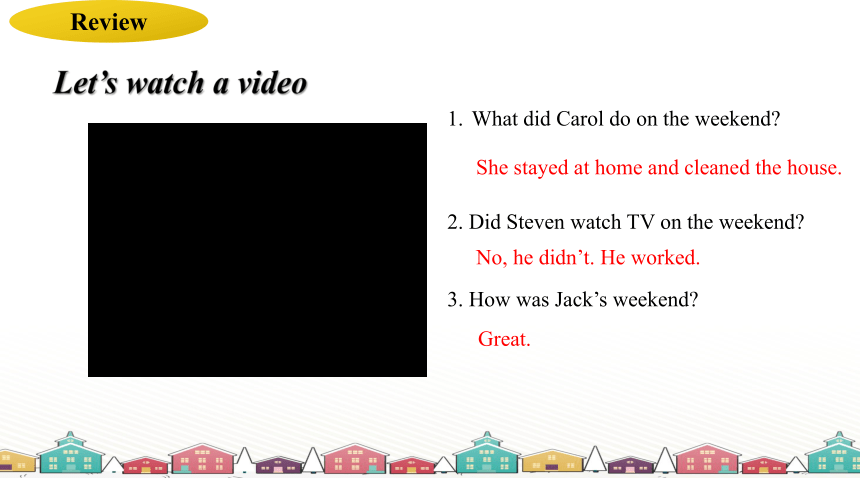
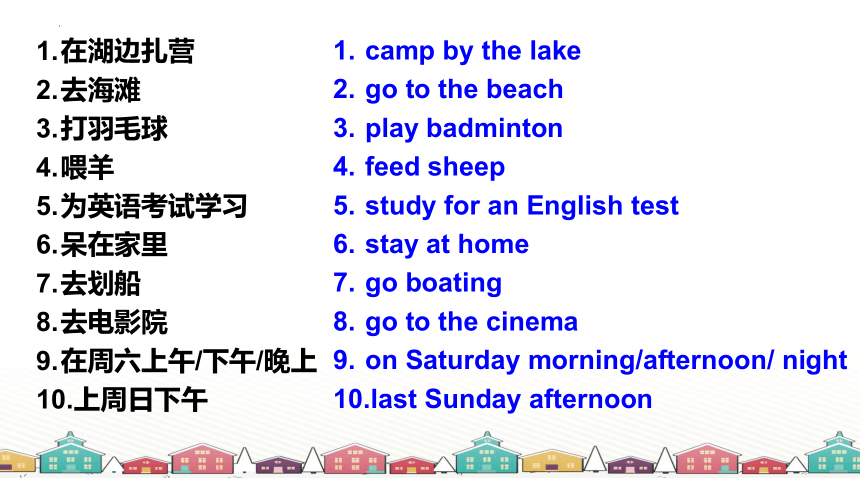
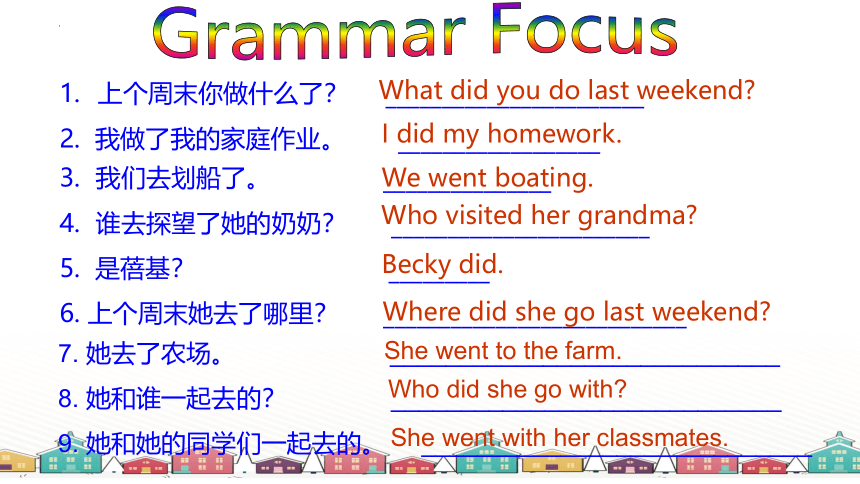
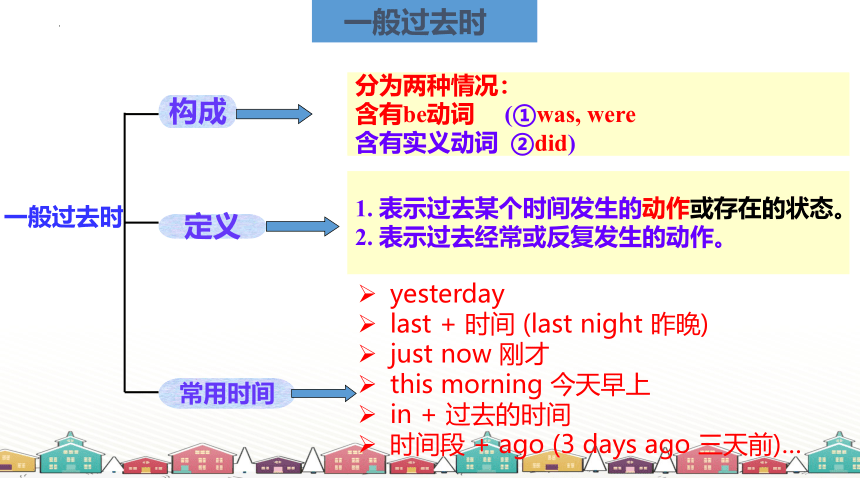
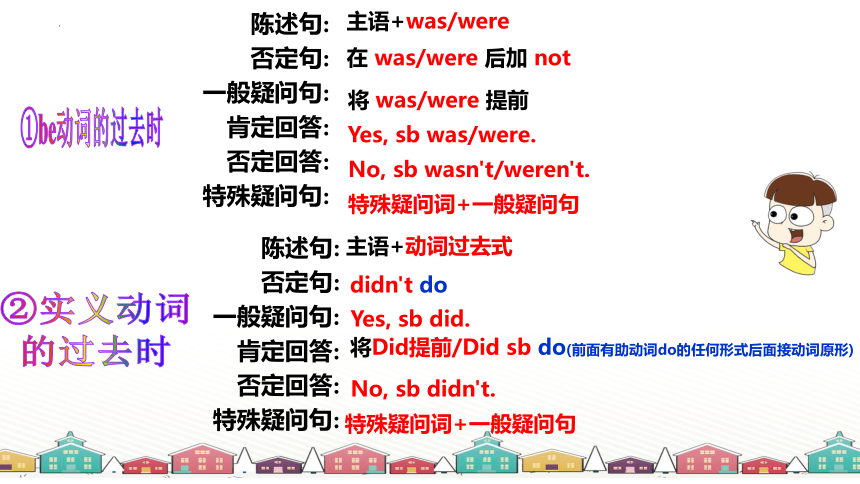
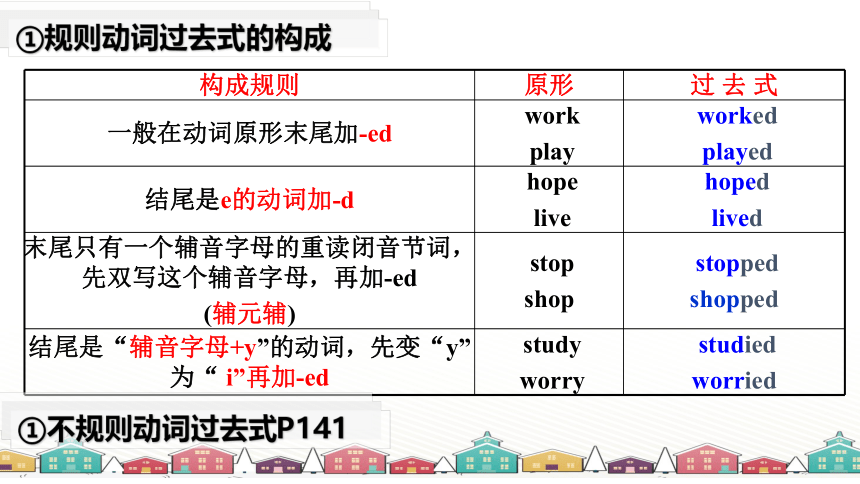
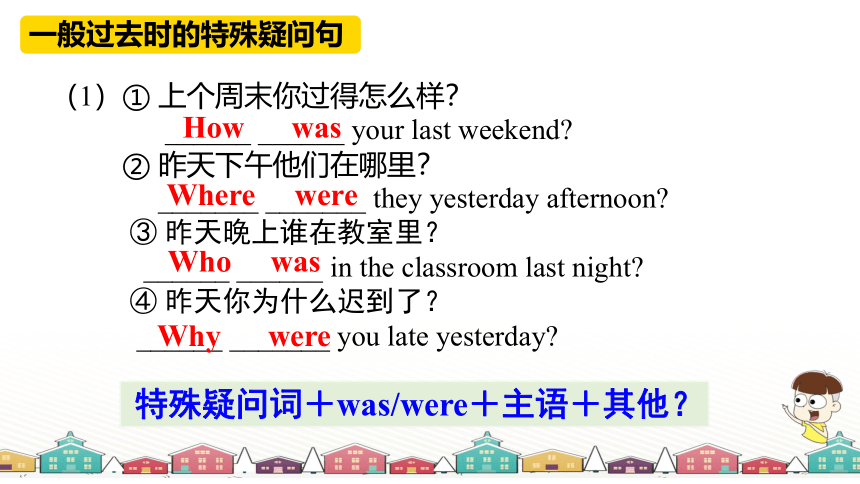
文档简介
(共23张PPT)
Unit 12 What did you do last weekend
Section A Grammar Focus-3c
学习目标
Key words & phrases:
away; run away; mouse (mice) ; baby; shout; shout at; woof; language; on Saturday morning.
Key sentences:
1. The weather was beautiful, so I went to the beach with my parents.
2. A family of mice were in the kitchen on Saturday morning when they saw a big cat.
3. That's why it's important to learn a second language.
To learn to ask and answer Wh-questions by using the past simple tense.
Review
Let’s watch a video
What did Carol do on the weekend
2. Did Steven watch TV on the weekend
3. How was Jack’s weekend
She stayed at home and cleaned the house.
Great.
No, he didn’t. He worked.
在湖边扎营
去海滩
打羽毛球
喂羊
为英语考试学习
呆在家里
去划船
去电影院
在周六上午/下午/晚上
10.上周日下午
camp by the lake
go to the beach
play badminton
feed sheep
study for an English test
stay at home
go boating
go to the cinema
on Saturday morning/afternoon/ night
10.last Sunday afternoon
上个周末你做什么了? _______________________
2. 我做了我的家庭作业。 __________________
I did my homework.
What did you do last weekend
Grammar Focus
我们去划船了。 _______________
谁去探望了她的奶奶? _______________________
5. 是蓓基? _________
6. 上个周末她去了哪里? ___________________________
Who visited her grandma
Where did she go last weekend
Becky did.
We went boating.
7. 她去了农场。 ____________________________
8. 她和谁一起去的? ____________________________
9. 她和她的同学们一起去的。 ____________________________
Who did she go with
She went to the farm.
She went with her classmates.
构成
定义
常用时间
分为两种情况:
含有be动词 (①was, were
含有实义动词 ②did)
1. 表示过去某个时间发生的动作或存在的状态。
2. 表示过去经常或反复发生的动作。
一般过去时
一般过去时
yesterday
last + 时间 (last night 昨晚)
just now 刚才
this morning 今天早上
in + 过去的时间
时间段 + ago (3 days ago 三天前)…
陈述句:
否定句:
一般疑问句:
肯定回答:
否定回答:
特殊疑问句:
①be动词的过去时
②实义动词
的过去时
主语+was/were
在 was/were 后加 not
将 was/were 提前
Yes, sb was/were.
No, sb wasn't/weren't.
特殊疑问词+一般疑问句
陈述句:
否定句:
一般疑问句:
肯定回答:
否定回答:
特殊疑问句:
主语+动词过去式
didn't do
将Did提前/Did sb do(前面有助动词do的任何形式后面接动词原形)
Yes, sb did.
No, sb didn't.
特殊疑问词+一般疑问句
构成规则 原形 过 去 式
一般在动词原形末尾加-ed work play worked
played
结尾是e的动词加-d hope live hoped
lived
末尾只有一个辅音字母的重读闭音节词,先双写这个辅音字母,再加-ed (辅元辅) stop shop stopped
shopped
结尾是“辅音字母+y”的动词,先变“y”为“ i”再加-ed study worry studied
worried
①规则动词过去式的构成
①不规则动词过去式P141
一般过去时的特殊疑问句
(1)① 上个周末你过得怎么样?
______ ______ your last weekend
② 昨天下午他们在哪里?
_______ _______ they yesterday afternoon
③ 昨天晚上谁在教室里?
______ ______ in the classroom last night
④ 昨天你为什么迟到了?
______ _______ you late yesterday
特殊疑问词+was/were+主语+其他?
How was
Where were
Who was
Why were
(2)① 昨天他做了什么事情?
_______ ______ he do yesterday
② 上个周末她参观了哪里?
______ ______ she ______ last weekend
③ 你和谁一起去的动物园?
______ ______ you go to the zoo with
④ 他们什么时候到达北京的?
_______ ______ they arrive in Beijing
What did
Where did visit
Who did
When did
特殊疑问词+did +动词原形+主语+其他?
★对某人做什么事提问时,用
★对事情发生的地点提问时,用
★对事情发生的时间提问时,用
★对人物提问时,用
★对原因提问时,用
★对做事情的方式提问时,用
疑问词的选用
what
where
when
who
why
how
①She went to a farm last weekend.
②She went with her classmates.
③They went there by bus.
④They fed some cows on the farm.
⑤They came back at four in the afternoon.
⑥ My weekend was great!
Where did she go last weekend
Who did she go with
How did they go there
What did they do on the farm
When did they come back
How was their weekend
Practice
Presentation
一般过去时和一般现在时的区别
一般过去时 一般现在时
用法不同 表示过去某个时间发生的动作或存在的状态。 I played badminton with my father last weekend. 我上周末和爸爸一起打羽毛球了。 表示经常发生或习惯性的动作或现在的状态。
I often play badminton with my father. 我经常和爸爸一起打羽毛球。
时间状语不同 一般过去时常与表示过去的时间状语连用,如last week, yesterday, two days ago, last month等。 He went to Japan last month. 他上个月去了日本。 一般现在时常与表示现在的时间状语连用,如every day, on weekends 等。
We read English every morning. 我们每天早上读英语。
Presentation
一般过去时 一般现在时
谓语动词不同 谓语动词使用过去式,没有人称和数的变化( was和were除外) Julia did her homework and I did some reading after class yesterday. 昨天下课后,朱莉娅做作业,我看书。 谓语动词有人称和数的变化。第三人称单数作主语时,谓语动词要使用第三人称单数形式(be动词用is);其他人称作主语时,则使用动词原形(be动词用am或are)。
My mother enjoys going shopping and I enjoy traveling. 我妈妈喜欢购物,我喜欢旅行。
A: ______ did you do last weekend
B: I played badminton on Saturday.
A: Sounds fun! _______ did you play with
B: I played with my father. He’s really good!
2. A: _______ was your weekend
B: It was great! I had so much fun!
A: ________ did you go
B: The weather was beautiful, so I went to the beach with my parents.
3. A: ______ did Jim lose
B: He lost his keys. He often loses things.
A: That’s too bad. ______ did he lose them
B: I heard it was yesterday.
3a
Fill in the blanks with who, what, when, where or how.
What
Who
How
Where
What
When
Ask and answer, then complete sentences according to the conversations in 3a.
1. I _________________ on Saturday.
2. I played badminton _________________.
3. I played badminton with _________________.
4. I went to _________________ with my parents last weekend.
5. He lost _________________ yesterday.
6. He lost his keys _________________.
7. _________________ lost his keys yesterday.
played badminton
my father
Jim
on Saturday
the beach
his keys
yesterday
What
When
Who
Where
What
When
Who
Complete the passage with the correct forms of the words in the box.
A family of mice were in the kitchen on Saturday morning when they _____ a big cat. Baby Mouse _____ afraid and _______ onto his father’s back. Father Mouse shouted at the cat, “Woof, woof!” The cat quickly _________. “Wow, Dad, you’re good!” _____ Baby Mouse. “Well, son, that’s why it’s important to learn a second language,” answered Father Mouse.
say be climb see run away
saw
was
climbed
ran away
said
shout at sb.
冲…大声叫嚷
shout at sb.多指因为生气等而非善意地对某人吼叫,带有感彩,意即:"对…怒吼”
shout to sb.只是客观地陈述,多指因距离远而不得不大声叫喊(否则对方无法听见),不带生气等感情因素。意即:“对…大声叫喊“
3b
跑开 away / we / adv. 离开;远离
/ma s/ mouse的复数形式 老鼠;耗子
/ be bi/ adj. 幼小的 n. 婴儿
shout / a t/ v. 呼叫;喊叫
/w f/ interj. (狗叫声)汪汪
/ l gw d / n. 语言
【用法详解】language 在此是可数名词,a second language意为“又一门语言”。表示具体某种语言的词,如 Chinese, English, Japanese 等,是不可数名词。
How many languages can you speak 你会说几门语言?
All the children must learn a foreign language. 所有的儿童必须学一门外语。
language n. 语言
2. “Well, son, that’s why it’s important to learn a second language,”
answered Father Mouse. “所以嘛,儿子,这就是为什么再学一门
语言很重要。”鼠爸爸回答道。 (教材P69 3b)
Point1
Language points
Presentation
表示说某种语言时,常用动词speak 。
That’s why... 句型
Point2
【用法详解】该句型意为“这/那就是......的原因”,其中why引导的从句,表示结果。
Tom overslept this morning. That’s why he was late for school. 汤姆今天早晨睡过头了,这就是他上学迟到的原因。
2. “Well, son, that’s why it’s important to learn a second language,”
answered Father Mouse. “所以嘛,儿子,这就是为什么再学一门
语言很重要。”鼠爸爸回答道。 (教材P69 3b)
Language points
Presentation
【拓展延伸】“That’s because ... ”也是一 个常用句型,意为
“这那是因为 …… , because引导的从句表示原因。
Tom was late for school this morning. That’s because he overslept. 汤姆今天早晨上学迟到了,那是因为他睡过头了。
Presentation
Presentation
Think of two things you did last weekend. Draw pictures
of them. Your classmates guess what you did.
3c
These patterns may help you
Did you...
Yes, I did./No, I didn’t.
You went to the mountains!
You went shopping!
...
Summary
Unit 12 What did you do last weekend (Grammar Focus-3c)
学会使用规则和不规则动词的一般过去式
Grammar
能用带有who, where, what等特殊疑问词的一般过去时句子询问信息并能做出正确回答
New words
Expressions
run away, shout at
away, mouse, baby, shout, woof, language
Homework
和你的朋友谈论你们的周末都去了哪里,做了什么。
请写出你和朋友的对话,至少10句。
Unit 12 What did you do last weekend
Section A Grammar Focus-3c
学习目标
Key words & phrases:
away; run away; mouse (mice) ; baby; shout; shout at; woof; language; on Saturday morning.
Key sentences:
1. The weather was beautiful, so I went to the beach with my parents.
2. A family of mice were in the kitchen on Saturday morning when they saw a big cat.
3. That's why it's important to learn a second language.
To learn to ask and answer Wh-questions by using the past simple tense.
Review
Let’s watch a video
What did Carol do on the weekend
2. Did Steven watch TV on the weekend
3. How was Jack’s weekend
She stayed at home and cleaned the house.
Great.
No, he didn’t. He worked.
在湖边扎营
去海滩
打羽毛球
喂羊
为英语考试学习
呆在家里
去划船
去电影院
在周六上午/下午/晚上
10.上周日下午
camp by the lake
go to the beach
play badminton
feed sheep
study for an English test
stay at home
go boating
go to the cinema
on Saturday morning/afternoon/ night
10.last Sunday afternoon
上个周末你做什么了? _______________________
2. 我做了我的家庭作业。 __________________
I did my homework.
What did you do last weekend
Grammar Focus
我们去划船了。 _______________
谁去探望了她的奶奶? _______________________
5. 是蓓基? _________
6. 上个周末她去了哪里? ___________________________
Who visited her grandma
Where did she go last weekend
Becky did.
We went boating.
7. 她去了农场。 ____________________________
8. 她和谁一起去的? ____________________________
9. 她和她的同学们一起去的。 ____________________________
Who did she go with
She went to the farm.
She went with her classmates.
构成
定义
常用时间
分为两种情况:
含有be动词 (①was, were
含有实义动词 ②did)
1. 表示过去某个时间发生的动作或存在的状态。
2. 表示过去经常或反复发生的动作。
一般过去时
一般过去时
yesterday
last + 时间 (last night 昨晚)
just now 刚才
this morning 今天早上
in + 过去的时间
时间段 + ago (3 days ago 三天前)…
陈述句:
否定句:
一般疑问句:
肯定回答:
否定回答:
特殊疑问句:
①be动词的过去时
②实义动词
的过去时
主语+was/were
在 was/were 后加 not
将 was/were 提前
Yes, sb was/were.
No, sb wasn't/weren't.
特殊疑问词+一般疑问句
陈述句:
否定句:
一般疑问句:
肯定回答:
否定回答:
特殊疑问句:
主语+动词过去式
didn't do
将Did提前/Did sb do(前面有助动词do的任何形式后面接动词原形)
Yes, sb did.
No, sb didn't.
特殊疑问词+一般疑问句
构成规则 原形 过 去 式
一般在动词原形末尾加-ed work play worked
played
结尾是e的动词加-d hope live hoped
lived
末尾只有一个辅音字母的重读闭音节词,先双写这个辅音字母,再加-ed (辅元辅) stop shop stopped
shopped
结尾是“辅音字母+y”的动词,先变“y”为“ i”再加-ed study worry studied
worried
①规则动词过去式的构成
①不规则动词过去式P141
一般过去时的特殊疑问句
(1)① 上个周末你过得怎么样?
______ ______ your last weekend
② 昨天下午他们在哪里?
_______ _______ they yesterday afternoon
③ 昨天晚上谁在教室里?
______ ______ in the classroom last night
④ 昨天你为什么迟到了?
______ _______ you late yesterday
特殊疑问词+was/were+主语+其他?
How was
Where were
Who was
Why were
(2)① 昨天他做了什么事情?
_______ ______ he do yesterday
② 上个周末她参观了哪里?
______ ______ she ______ last weekend
③ 你和谁一起去的动物园?
______ ______ you go to the zoo with
④ 他们什么时候到达北京的?
_______ ______ they arrive in Beijing
What did
Where did visit
Who did
When did
特殊疑问词+did +动词原形+主语+其他?
★对某人做什么事提问时,用
★对事情发生的地点提问时,用
★对事情发生的时间提问时,用
★对人物提问时,用
★对原因提问时,用
★对做事情的方式提问时,用
疑问词的选用
what
where
when
who
why
how
①She went to a farm last weekend.
②She went with her classmates.
③They went there by bus.
④They fed some cows on the farm.
⑤They came back at four in the afternoon.
⑥ My weekend was great!
Where did she go last weekend
Who did she go with
How did they go there
What did they do on the farm
When did they come back
How was their weekend
Practice
Presentation
一般过去时和一般现在时的区别
一般过去时 一般现在时
用法不同 表示过去某个时间发生的动作或存在的状态。 I played badminton with my father last weekend. 我上周末和爸爸一起打羽毛球了。 表示经常发生或习惯性的动作或现在的状态。
I often play badminton with my father. 我经常和爸爸一起打羽毛球。
时间状语不同 一般过去时常与表示过去的时间状语连用,如last week, yesterday, two days ago, last month等。 He went to Japan last month. 他上个月去了日本。 一般现在时常与表示现在的时间状语连用,如every day, on weekends 等。
We read English every morning. 我们每天早上读英语。
Presentation
一般过去时 一般现在时
谓语动词不同 谓语动词使用过去式,没有人称和数的变化( was和were除外) Julia did her homework and I did some reading after class yesterday. 昨天下课后,朱莉娅做作业,我看书。 谓语动词有人称和数的变化。第三人称单数作主语时,谓语动词要使用第三人称单数形式(be动词用is);其他人称作主语时,则使用动词原形(be动词用am或are)。
My mother enjoys going shopping and I enjoy traveling. 我妈妈喜欢购物,我喜欢旅行。
A: ______ did you do last weekend
B: I played badminton on Saturday.
A: Sounds fun! _______ did you play with
B: I played with my father. He’s really good!
2. A: _______ was your weekend
B: It was great! I had so much fun!
A: ________ did you go
B: The weather was beautiful, so I went to the beach with my parents.
3. A: ______ did Jim lose
B: He lost his keys. He often loses things.
A: That’s too bad. ______ did he lose them
B: I heard it was yesterday.
3a
Fill in the blanks with who, what, when, where or how.
What
Who
How
Where
What
When
Ask and answer, then complete sentences according to the conversations in 3a.
1. I _________________ on Saturday.
2. I played badminton _________________.
3. I played badminton with _________________.
4. I went to _________________ with my parents last weekend.
5. He lost _________________ yesterday.
6. He lost his keys _________________.
7. _________________ lost his keys yesterday.
played badminton
my father
Jim
on Saturday
the beach
his keys
yesterday
What
When
Who
Where
What
When
Who
Complete the passage with the correct forms of the words in the box.
A family of mice were in the kitchen on Saturday morning when they _____ a big cat. Baby Mouse _____ afraid and _______ onto his father’s back. Father Mouse shouted at the cat, “Woof, woof!” The cat quickly _________. “Wow, Dad, you’re good!” _____ Baby Mouse. “Well, son, that’s why it’s important to learn a second language,” answered Father Mouse.
say be climb see run away
saw
was
climbed
ran away
said
shout at sb.
冲…大声叫嚷
shout at sb.多指因为生气等而非善意地对某人吼叫,带有感彩,意即:"对…怒吼”
shout to sb.只是客观地陈述,多指因距离远而不得不大声叫喊(否则对方无法听见),不带生气等感情因素。意即:“对…大声叫喊“
3b
跑开 away / we / adv. 离开;远离
/ma s/ mouse的复数形式 老鼠;耗子
/ be bi/ adj. 幼小的 n. 婴儿
shout / a t/ v. 呼叫;喊叫
/w f/ interj. (狗叫声)汪汪
/ l gw d / n. 语言
【用法详解】language 在此是可数名词,a second language意为“又一门语言”。表示具体某种语言的词,如 Chinese, English, Japanese 等,是不可数名词。
How many languages can you speak 你会说几门语言?
All the children must learn a foreign language. 所有的儿童必须学一门外语。
language n. 语言
2. “Well, son, that’s why it’s important to learn a second language,”
answered Father Mouse. “所以嘛,儿子,这就是为什么再学一门
语言很重要。”鼠爸爸回答道。 (教材P69 3b)
Point1
Language points
Presentation
表示说某种语言时,常用动词speak 。
That’s why... 句型
Point2
【用法详解】该句型意为“这/那就是......的原因”,其中why引导的从句,表示结果。
Tom overslept this morning. That’s why he was late for school. 汤姆今天早晨睡过头了,这就是他上学迟到的原因。
2. “Well, son, that’s why it’s important to learn a second language,”
answered Father Mouse. “所以嘛,儿子,这就是为什么再学一门
语言很重要。”鼠爸爸回答道。 (教材P69 3b)
Language points
Presentation
【拓展延伸】“That’s because ... ”也是一 个常用句型,意为
“这那是因为 …… , because引导的从句表示原因。
Tom was late for school this morning. That’s because he overslept. 汤姆今天早晨上学迟到了,那是因为他睡过头了。
Presentation
Presentation
Think of two things you did last weekend. Draw pictures
of them. Your classmates guess what you did.
3c
These patterns may help you
Did you...
Yes, I did./No, I didn’t.
You went to the mountains!
You went shopping!
...
Summary
Unit 12 What did you do last weekend (Grammar Focus-3c)
学会使用规则和不规则动词的一般过去式
Grammar
能用带有who, where, what等特殊疑问词的一般过去时句子询问信息并能做出正确回答
New words
Expressions
run away, shout at
away, mouse, baby, shout, woof, language
Homework
和你的朋友谈论你们的周末都去了哪里,做了什么。
请写出你和朋友的对话,至少10句。
同课章节目录
- Unit 1 Can you play the guitar?
- Section A
- Section B
- Unit 2 What time do you go to school?
- Section A
- Section B
- Unit 3 How do you get to school?
- Section A
- Section B
- Unit 4 Don't eat in class.
- Section A
- Section B
- Unit 5 Why do you like pandas?
- Section A
- Section B
- Unit 6 I'm watching TV.
- Section A
- Section B
- Review of Units 1-6
- Unit 7 It's raining!
- Section A
- Section B
- Unit 8 Is there a post office near here?
- Section A
- Section B
- Unit 9 What does he look like?
- Section A
- Section B
- Unit 10 I'd like some noodles.
- Section A
- Section B
- Unit 11 How was your school trip?
- Section A
- Section B
- Unit 12 What did you do last weekend?
- Section A
- Section B
